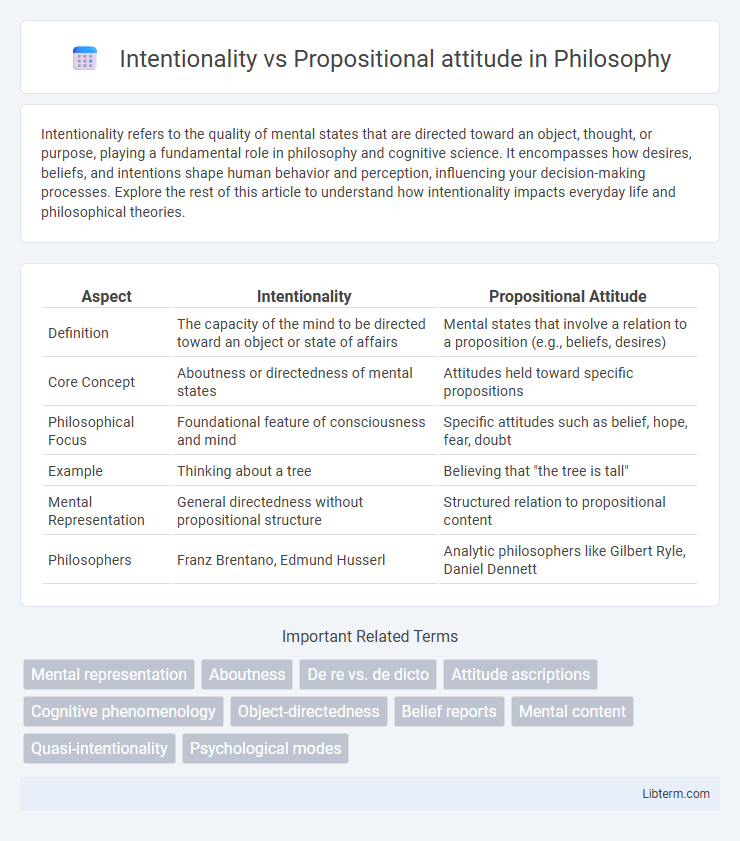Intentionality refers to the quality of mental states that are directed toward an object, thought, or purpose, playing a fundamental role in philosophy and cognitive science. It encompasses how desires, beliefs, and intentions shape human behavior and perception, influencing your decision-making processes. Explore the rest of this article to understand how intentionality impacts everyday life and philosophical theories.
Table of Comparison
| Aspect | Intentionality | Propositional Attitude |
|---|---|---|
| Definition | The capacity of the mind to be directed toward an object or state of affairs | Mental states that involve a relation to a proposition (e.g., beliefs, desires) |
| Core Concept | Aboutness or directedness of mental states | Attitudes held toward specific propositions |
| Philosophical Focus | Foundational feature of consciousness and mind | Specific attitudes such as belief, hope, fear, doubt |
| Example | Thinking about a tree | Believing that "the tree is tall" |
| Mental Representation | General directedness without propositional structure | Structured relation to propositional content |
| Philosophers | Franz Brentano, Edmund Husserl | Analytic philosophers like Gilbert Ryle, Daniel Dennett |
Understanding Intentionality: Core Concepts
Intentionality refers to the mind's capacity to represent objects, properties, or states of affairs, driving mental states like beliefs and desires toward particular contents. This concept contrasts with propositional attitudes, which are specific mental states directed at propositions, such as believing or hoping that something is true. Understanding intentionality involves exploring how mental representations acquire aboutness and relate to reality, forming the basis for cognition and communication.
Defining Propositional Attitude: An Overview
Propositional attitude refers to a mental state held by an individual toward a proposition, such as believing, desiring, or fearing that a particular statement is true or false. It involves the relation between a person and the content of their thought, typically expressed in the form "subject has attitude toward proposition." Understanding propositional attitudes is crucial in philosophy of mind and cognitive science for analyzing how beliefs, intentions, and desires shape human cognition and behavior.
Historical Background: Philosophical Roots
Intentionality, rooted in Franz Brentano's 19th-century philosophy, describes the mind's capacity to direct itself toward objects or states, emphasizing the "aboutness" of mental phenomena. Propositional attitudes, extensively analyzed by philosophers like Frege and Russell, concern the specific mental states such as belief, desire, or hope that relate to propositions or statements. This distinction reflects the evolution of analytic philosophy, where intentionality formed the foundation for understanding consciousness, while propositional attitudes clarified the structure of mental content and language.
Key Differences Between Intentionality and Propositional Attitude
Intentionality refers to the capacity of the mind to represent objects or states of affairs, directing thoughts toward something, while propositional attitude involves the specific mental stance one holds toward a proposition, such as believing, hoping, or fearing. The key difference lies in intentionality being a broader phenomenon encompassing all mental representations, whereas propositional attitudes are particular instances characterized by mental states directed at propositional content. Intentionality captures the directedness of consciousness itself, whereas propositional attitudes specify the cognitive or emotional relation to a represented proposition.
The Role of Language in Both Concepts
Intentionality refers to the mind's capacity to be directed toward objects, properties, or states of affairs, whereas propositional attitudes involve mental states like beliefs or desires expressed in relation to propositions. Language plays a crucial role by structuring and conveying these mental states through syntax and semantics, enabling precise representation and communication of intentional content. The interaction between linguistic expressions and cognitive mechanisms reveals how meaning and reference are encoded within both intentionality and propositional attitudes.
Intentional States and Mental Representation
Intentionality refers to the capacity of mental states to be directed toward or about objects and states of affairs, encapsulating how the mind represents and relates to the world. Propositional attitudes are specific types of intentional states where mental states express an attitude toward a proposition, such as belief or desire. Mental representation underpins intentional states by encoding information that allows the cognitive system to simulate or stand for external reality within the mind's framework.
Propositional Attitudes in Cognitive Science
Propositional attitudes in cognitive science refer to the mental states held by an individual toward propositions, such as beliefs, desires, and intentions, which play a crucial role in understanding human cognition and behavior. These attitudes allow researchers to model how people represent and interpret information about the world, enabling predictions about decision-making and action. Emphasizing propositional attitudes facilitates the development of theories in cognitive psychology, artificial intelligence, and linguistics by clarifying how mental content relates to external reality.
Common Misconceptions and Overlaps
Intentionality and propositional attitudes are often conflated, but intentionality refers to the mind's ability to represent objects or states of affairs, whereas propositional attitudes specifically involve mental states directed at propositions, such as belief, desire, and hope. Common misconceptions arise when intentionality is reduced solely to propositional attitudes, ignoring its broader scope in mental representation. Overlaps occur because propositional attitudes exemplify intentional states, yet intentionality also encompasses non-propositional experiences like perception and imagination.
Practical Implications in Philosophy of Mind
Intentionality refers to the mind's capacity to represent objects and states of affairs, while propositional attitudes are the specific mental states directed at propositions, such as belief or desire. Understanding this distinction clarifies practical debates in philosophy of mind concerning mental content, cognitive science modeling, and the nature of consciousness. Distinguishing intentionality from propositional attitudes aids in developing more precise theories of mental representation and informs approaches to artificial intelligence and neuropsychology.
Future Directions: Research and Debate
Future research on intentionality and propositional attitudes aims to clarify the cognitive mechanisms underlying mental states such as beliefs and desires, particularly how these states represent objects or events. Scholars are increasingly examining the interplay between neurocognitive processes and philosophical theories to better understand intentionality's role in contextualizing mental content. Emerging debates concentrate on refining the distinctions between different propositional attitudes and their implications for artificial intelligence and cognitive science modeling.
Intentionality Infographic

 libterm.com
libterm.com